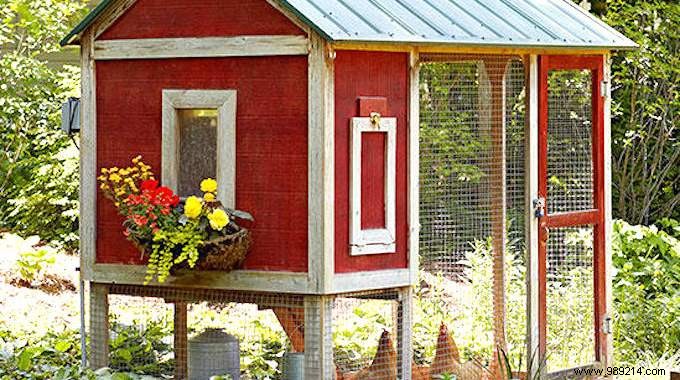
More and more people have chickens in their backyard.
Not only is it cheap to feed...
...but what's more, it gives you good fresh eggs for free!
If you, too, are thinking of raising a few chickens at home, there are a few basic things to know.
Especially if it's your first chicken coop !
This Beginners Guide will allow you to have a great chicken coop with happy and healthy hens! Watch:

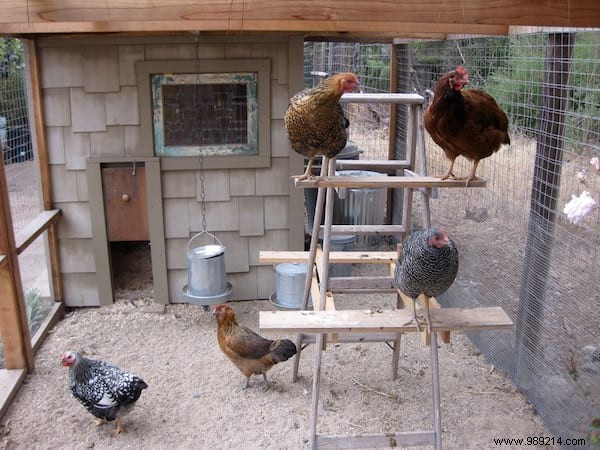
The coop is where your chickens will sleep and lay their eggs. It is therefore important that they feel at home there!
For a chicken coop to be well laid out, it must consist of several things.
First of all, a chicken coop needs a security lock on the door.
But you also need fabric-covered windows to keep predators out , especially at night.
Inside, the chicken coop should have bars or branches for the hens to perch on and rest on.
But that's not all ! Hens must also have nesting boxes filled with straw or pine shavings to lay their eggs in.
Provide a nest box in the chicken coop for 3 or 4 hens and space them about 1 meter apart.
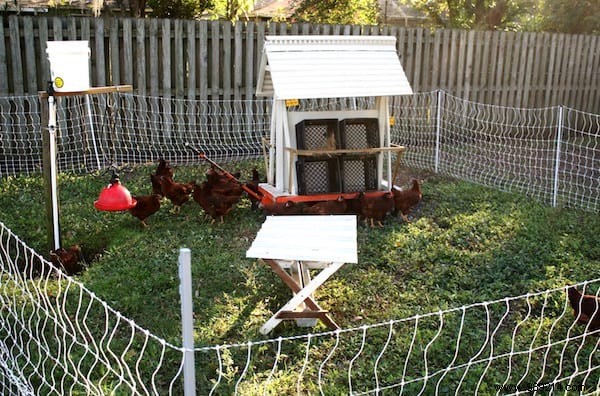
Hens need space to stretch their legs and be healthy.
It is for this reason that having an enclosure in addition the chicken coop is essential to have happy hens.
The enclosure will allow your hens to keep busy all day in safety.
In particular, they will be able to catch insects, roll in the dust, expose themselves to the sun and run after each other.
This enclosure must be surrounded by a chain-link fence to prevent foxes, dogs and other predators from wreaking havoc.
It must also be covered to prevent raptors such as hawks and owls from coming to use the enclosure.
For your hens to have enough space, provide at least 3 m2 of space per hen .
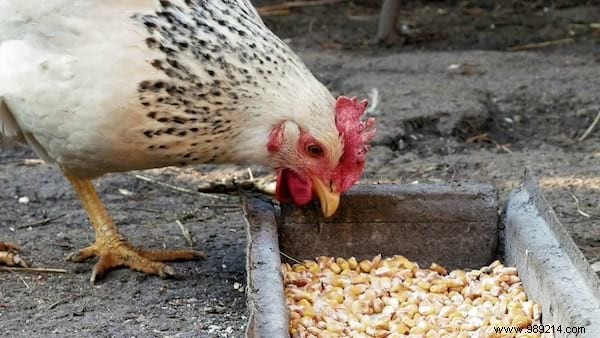
From 5 to 6 months of age, hens can be fed basic adult feed.
What can you feed chickens? It can be whole, granulated or crushed seeds.
In any case, preferably choose organic seeds without GMOs.
Food can be enriched with omega 3 and other nutrients, but it is not mandatory.
If you want to feed your chickens well on the cheap, discover our tips here.
The best is to feed them twice a day:for 1/2 hour in the morning and as much in the evening.
But you can also leave them self-service food.
If you opt for this formula, scatter the seeds all over the pen so that the hens can find them.
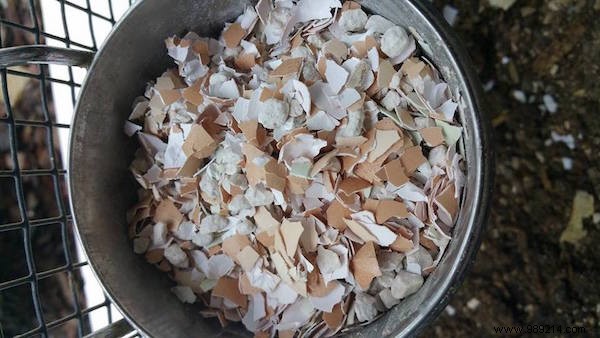
In addition to conventional feed, laying hens need a calcium supplement to stimulate egg laying.
To provide them with this calcium, you can use eggshells or crushed oyster shells.
This supplement should be freely available in a separate container.
So each hen can eat as much as she needs.
Be aware that roosters and chickens do not need this supplement, it is only for laying hens.
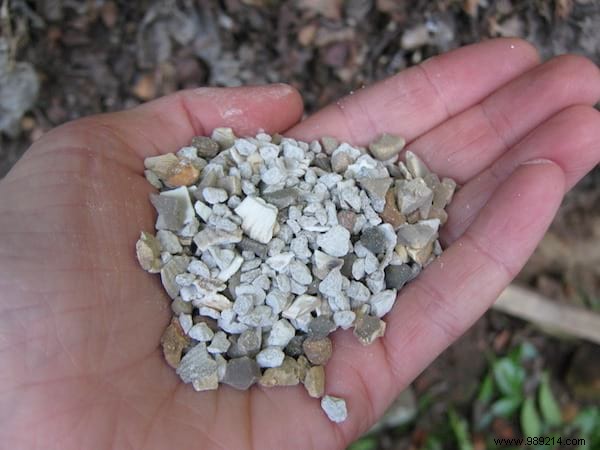
Did you know that hens need to eat some gravel to digest better their food?
To do this, just put some gravel in the enclosure.
There are sachets on the market, but be aware that free-range hens usually find it on their own.
Check if you have any on the floor to know if you should buy some or not.
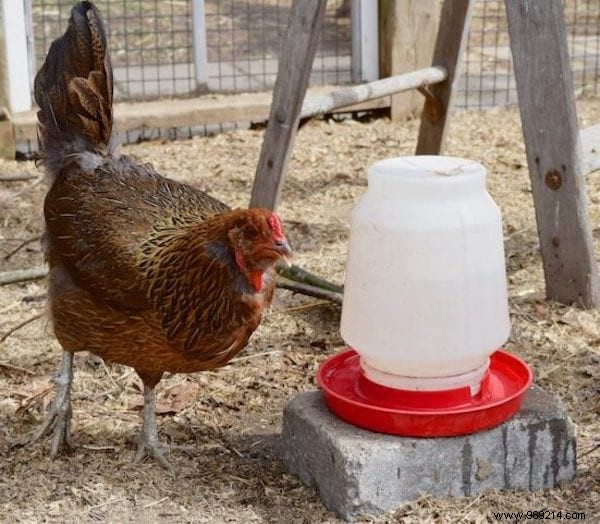
Hens need permanent access to fresh, clean water.
Be careful that the water does not stagnate to avoid bacteria.
You can add apple cider vinegar (1 tablespoon of apple cider vinegar to 4 liters of water) several times a week.
This prevents the formation of algae and the proliferation of bacteria. In addition, it is good for the health of your hens.
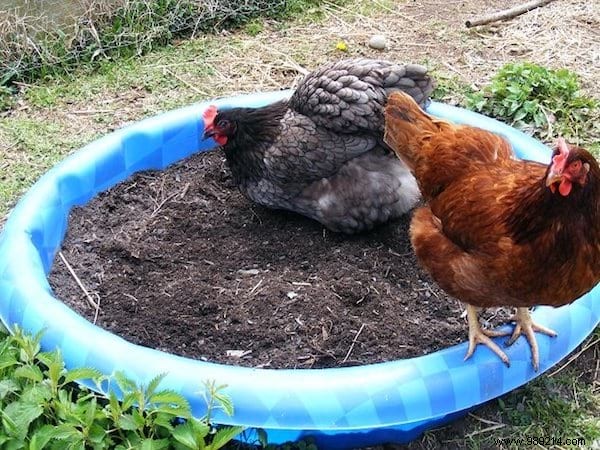
Chickens love to roll in the sand or dirt to remove parasites which hang on their feathers.
They must have access to it at all times of the day to be able to eliminate fleas and other parasites easily.
In addition, the advantage of the dust container is that their feathers stay clean.
To make your homemade dustbin, you can use an inflatable kiddie pool filled with sand.
It can also be in a large container or in an old tire like here in this trick.
Be aware that if there is no specific place in the chicken coop to take a dust bath.
The hens will create it themselves by making holes in the ground.